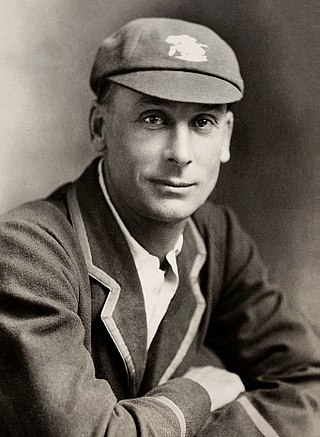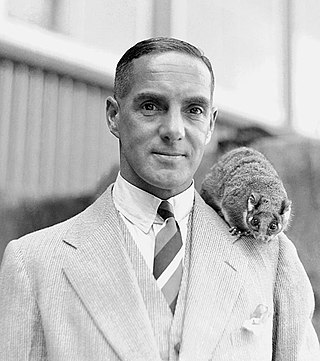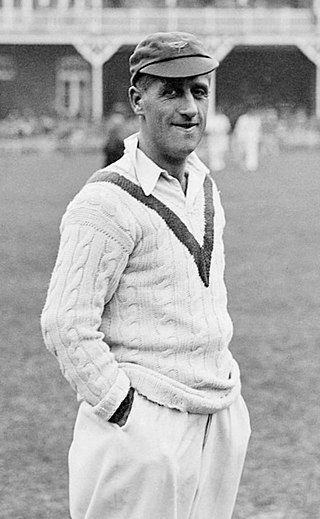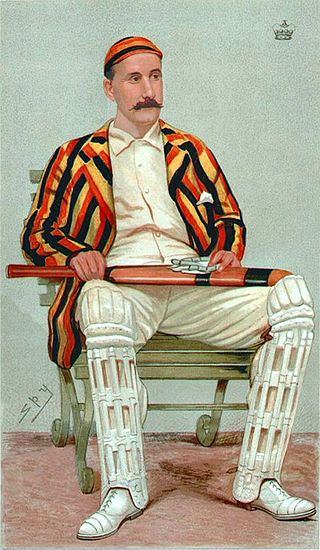Simon Paul Sutcliffe (born 22 May 1960) is a former English cricketer active from 1980 to 1983 who played for Warwickshire, Oxford University and the combined Oxford and Cambridge Universities cricket team. He was born in Watford. He appeared in 38 first-class matches as a righthanded batsman who bowled right arm off break. He scored 141 runs with a highest score of 20 and held six catches. He took 96 wickets with a best performance of six for 19. [1]

Sir John Berry Hobbs was an English professional cricketer who played for Surrey from 1905 to 1934 and for England in 61 Test matches between 1908 and 1930. Known as "The Master", he is widely regarded as one of the greatest batsmen in the history of cricket. He is the leading run-scorer and century-maker in first-class cricket, with 61,760 runs and 199 centuries. A right-handed batsman and an occasional right-arm medium pace bowler, Hobbs also excelled as a fielder, particularly in the position of cover point. Hobbs was named as one of the five Wisden Cricketers of the Century alongside Sir Donald Bradman, Sir Garfield Sobers, Shane Warne, and Sir Viv Richards.
Ian David Stockley Smith is a New Zealand cricket and rugby commentator and former cricketer. He played as a wicket-keeper for New Zealand throughout the 1980s and part of the 1990s.

Herbert Sutcliffe was an English professional cricketer who represented Yorkshire and England as an opening batsman. Apart from one match in 1945, his first-class career spanned the period between the two world wars. His first-class debut was delayed by the First World War until 1919 and his career was effectively terminated in August 1939 when he was called up for military service in the imminent Second World War. He was the first cricketer to score 16 centuries in Test match cricket. He is most famous for being the partner of Jack Hobbs and the partnership between the two, Hobbs and Sutcliffe, is widely regarded as the greatest partnership of all time.

Walter Arnold Hadlee was a New Zealand cricketer and Test match captain. He played domestic first-class cricket for Canterbury and Otago. Three of his five sons, Sir Richard, Dayle and Barry played cricket for New Zealand. The Chappell–Hadlee Trophy, which is competed for by ODI teams from New Zealand and Australia is named in honour of the Hadlee family and the Australian Chappell family.

Bert Sutcliffe was a New Zealand Test cricketer. Sutcliffe was a successful left-hand batsman. His batting achievements on tour in England in 1949, which included four fifties and a century in the Tests, earned him the accolade of being one of Wisden's Five Cricketers of the Year. He captained New Zealand in four Tests in the early 1950s, losing three of them and drawing the other. None of Sutcliffe's 42 Tests resulted in a New Zealand victory. In 1949 Sutcliffe was named the inaugural New Zealand Sportsman of the Year, and in 2000 was named as New Zealand champion sportsperson of the decade for the 1940s.

Martin Paterson Donnelly was a New Zealand-born sportsman who played Test cricket for New Zealand and rugby union for England. He worked for Courtaulds in England and Sydney.

Roger Charles Blunt was a cricketer who played nine Test matches for the New Zealand national cricket team.

Percy Holmes was an English first-class cricketer, who played for Yorkshire and England.
John Arnold was an English cricketer and football player.
Iain John Sutcliffe is a former English cricketer who played for the cricket teams of Oxford University, Combined Universities, Leicestershire, British Universities and Lancashire. He played as a left-handed batsman, primarily as an opener in four-day cricket, and as a very occasional spin bowler. He also represented Oxford University as a middleweight boxer.
The Honourable John Bonynge Coventry was an English cricketer who played 75 times in first-class cricket for Worcestershire between 1919 and 1935, captaining the county for the latter part of the 1929 and the whole of the 1930 seasons, although he played in only July and August of the latter year.
The New Zealand cricket team toured England in the 1949 season. The team was the fourth official touring side from New Zealand, following those in 1927, 1931 and 1937, and was by some distance the most successful to this date. The four-match Test series with England was shared, every game ending as a draw, and of 35 first-class fixtures, 14 were won, 20 drawn and only one lost.
The New Zealand cricket team toured England in the 1958 season. In a notably wet summer when the touring side lost the equivalent of 29 full days of cricket, the side lost four of the five Test matches. In first-class matches, they won six of their first nine games, but then won only one more all season, although they only lost two matches outside the Tests, both of them to Surrey.
The New Zealand cricket team toured England in the 1965 season, playing three Test matches in the first half of a damp summer. England later hosted a second three-match series against South Africa, the first time two Test series were played in a single English cricket season since the 1912 Triangular Tournament.
The New Zealand national cricket team toured South Africa from October 1953 to February 1954 and played a five match Test series against the South Africa national cricket team. South Africa won the Test series 4–0. The tour was the first by a representative New Zealand side to South Africa and the tourists embarked on their visit without having won a Test match since they had been granted full member status of the Imperial Cricket Conference in 1930.

William Herbert Hobbs Sutcliffe was an English amateur first-class cricketer, and the son of Herbert Sutcliffe; his middle name was in honour of Jack Hobbs.
Col. Sir William Arthington Worsley, 4th Baronet, was an English landowner and amateur first-class cricketer.
James Armstrong Chadwin QC was a prominent British barrister, whose cases included defending Peter Sutcliffe, the "Yorkshire Ripper".

The Yorkshire captaincy affair of 1927 arose from a disagreement among members of Yorkshire County Cricket Club over the selection of a new captain to succeed the retired Major Arthur Lupton. The main issue was whether a professional cricketer should be appointed to the post. It was a tradition throughout English county cricket that captains should always be amateurs. At Yorkshire, a succession of amateur captains held office in the 1920s, on the grounds of their supposed leadership qualities, although they were not worth their place in the team as cricketers. None lasted long; after Lupton's departure some members felt it was time to appoint a more accomplished cricketer on a long-term basis.
Anthony George Pelham played first-class cricket for Sussex, Cambridge University and Somerset between 1930 and 1934. He was born at Minehead, Somerset and died at Dorking, Surrey.